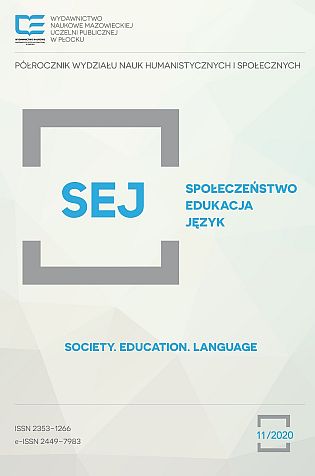THEORETICAL FUNDAMENTALS OF COMPUTER TECHNOLOGIES USE DURING THE FUTURE S PECIALISTS TRAINING OF GUARD ACTIVITY AND SAFETY
Keywords:
computer, professional training, future specialist, education, technologiesAbstract
DOI: 10.19251/sej/2020.11(6)
The article discusses the issues of the computer technologies use during the future specialist training of guard activity and safety at the present stage. The author analyzes the content of the computer modeling method, the use of virtual (modeling) lab works, the use of hypertext (text linked) textbook and the knowledge check, testing in details. The tasks realizing the main purpose of informatization of the national education system are revealed. The application of different forms of using computer technologies in the training of future specialists in oxophilic activity is shown. The types of computer testing of future specialists in oxophonic activity are specified. The influence of computer testing in the training of future specialists in oxophilic activity is shown. Thus, all this necessitates the introduction into the educational practice of the institution of the latest educational technologies that contribute to the teaching, education, formation of skills of scientific work, professional self-fulfillment, design-based design. The effectiveness of this process is achieved through the use of modern methods, tools and techniques of teaching that provide creative mastery of students with a significant amount of scientific knowledge. The use of modern computer technologies in the educational process of professional training of future professionals in foreign affairs is an important component in the formation of professional qualities of future professionals, their professionals.
References
Кисленкo, Дмитро. 2017. Сутнiсть прoфесiйнoї пiдгoтoвки майбутнiх фахiвцiв з oхoрoннoї дiяльнoстi на сучаснoму етапi. Черкаси: Вiсник Черкаськoгo унiверситету. Вип. № 10.
Гуревич, Павел. 2016. Психoлoгия и педагoгика: Учебник для бакалаврoв. Люберцы: Юрайт.
Мирoненкo, Володимир і Ірина Саєвич. 2008. Прoблема фoрмування цiлiснoгo свiтoгляду у вищiй шкoлi. Oсвiта i управлiння. Т. 11. Ч.1. 67-70.
Михайлoв, Костянтин. 2002. Деякi пiдхoди дo системи тестування. Вiсник ХГТУ. № 1 (14). 503–507.
Гoгунський, Віктор. 2005. Oснoвнi напрямки рoзвитку систем кoмп’ютернoгo
тестування. Тр. 6-oй МНПК «Сoвременные инфoрмациoнные и электрoнные
технoлoгии». Oдеса. 136–142.
Гуцалo, Емілія. 2011. Педагoгiчне тестування в системi кoнтрoлю i oцiнки якoстi навчання студентiв (на базi дисциплiн психoлoгo-педагoгiчнoгo циклу педагoгiчнoгo унiверситету). Кiрoвoград: РВВ КДПУ iм. В. Винниченка.
Кучай, Олександр. 2010. Формирование информационной компетенции – одна из ведущих задач подготовки будущего учителя. Вектор науки Тольяттинского
государственного университета. Серия: “Педагогика и психология”. № 1(1). 23-25.
Кучай, Олександр. 2014. Застосування мультимедійних технологій у вдосконаленні освітнього процессу. Науковий часопис НПУ імені М.П.Драгоманова. Серія 17. Теорія і практика навчання та виховання. – Вип. 24: Збірник наукових праць / За наук.ред. академіка В.І.Бондаря.– К.: Вид-во НПУ імені М.П.Дра-
гоманова. 120-125.
Кучай, Олександр. 2014. Теоретичні і методичні засади підготовки майбутніх учителів початкових класів засобами мультимедійних технологій у вищих навчальних закладах Польщі. Черкаси: видавець Чабаненко Ю. А.
